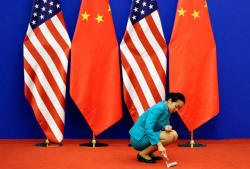|
U.S. business in China
warms to possible Trump trade policy shake-up
 Send a link to a friend
Send a link to a friend
 [February 15, 2017]
By Michael Martina and Matthew Miller [February 15, 2017]
By Michael Martina and Matthew Miller
BEIJING
(Reuters) - "Reciprocity" has become the new buzzword in the U.S.
business community in China, with some industry leaders saying they
would welcome a tougher approach from the Trump administration in
opening up the markets of the world's second-largest economy.
It's a striking shift within the American community here, which had long
lobbied Washington against taking more aggressive policies, fearing they
could draw retribution from China's leaders.
President Donald Trump's picks for Commerce Secretary and Trade
Representative, Wilbur Ross and Robert Lighthizer, have in the past
backed the reciprocity principle when it comes to China: that Beijing
should provide the same access and benefits to American business in
China that Washington gives the Chinese in the United States.
"Our membership has moved to some extent in that direction as well, in
advocating a firmer posture with respect to China," said Lester Ross,
chairman of the American Chamber of Commerce in China's policy
committee.
He made the remarks in January after the group issued a report that
found over 60 percent of the chamber's members had "little or no
confidence that the Chinese government is committed to opening markets
further in the next three years".
Many sectors of China's economy are either off limits or severely
restricted to foreign investors.
Foreign banks in China, for example, account for less than 2 percent of
total assets, according to the China Banking Regulatory Commission.

A 50-percent ownership cap for foreign life insurers, despite China's
2001 World Trade Organization commitments to lift it, has helped limit
their market share to about 6 percent.
China's Anbang Insurance Group <ANBANG.UL>, on the other hand, has spent
more than $8 billion acquiring U.S. assets, including the Waldorf
Astoria Hotel and Strategic Hotels & Resorts. It is still waiting for
regulatory approval to buy U.S. life insurer Fidelity & Guaranty Life <FGL.N>
for $1.6 billion.
"CHINA HAS OVERREACHED"
The same imbalances can be seen in sectors such as automotives, payment
cards and technology.
China's Geely Holding Group [GEELY.UL] bought Volvo from Ford Motor Co.
<F.N> in 2010, but foreign companies are required to set up joint
ventures to assemble vehicles in China, often transferring technology in
the process.
While China's UnionPay has grown to become the world's largest payment
card, according to the number of cards issued, U.S. credit card
operators Visa <V.N> and MasterCard <MA.N> have yet to be independently
licensed to clear transactions in China, despite a 2012 WTO ruling
mandating that Beijing open the sector.
Foreign technology hardware and service providers are bristling at
requirements to meet the restrictive terms of newly minted cyber
security regulations. Beijing's "Made in China 2025" plan also calls for
a progressive increase in domestic parts used in priority sectors, such
as advanced information technology and robotics to 70 percent by 2025.
James McGregor, Chairman of APCO Worldwide, Greater China, said the idea
of some form of reciprocity is gaining traction, particularly in
combating "techno-nationalism". "You've got Chinese companies that have
protected markets and make loads of money and then they are going out
and doing international acquisitions that could destroy other
companies," McGregor said. "Now China has overreached so much they have
alienated much of the business community."
[to top of second column] |

An attendant cleans the carpet next to U.S. and Chinese national
flags before a news conference for the 6th round of U.S.-China
Strategic and Economic Dialogue at the Great Hall of the People in
Beijing, July 10, 2014. REUTERS/Jason Lee/File Photo

McGregor said U.S. policy makers had to figure out how to use America's
openness and rule of law to deal with China, instead of allowing them to
become vulnerabilities. The question is how to craft a reciprocity
policy without destabilizing bilateral relations or triggering a
retaliatory backlash against U.S. businesses in China.
Chinese state media has warned that U.S. businesses could be targets in
any trade war that Trump may unleash - he has threatened to label China
a currency manipulator and slap heavy tariffs on Chinese goods.
China's Ministry of Commerce did not respond to a request for comment on
the issue of reciprocity.
But Tu Xinquan, a trade expert at Beijing's University of International
Business and Economics, said Trump's options would be limited by his
promises to create jobs.
"If you close the door to Chinese investments, that's not good for
American employment," Tu said.
BAD POLICY
One way to achieve reciprocity would be to use the Committee on Foreign
Investment in the United States (CFIUS) security review process to wall
off industries where U.S. businesses face discrimination in China. But
most experts see that as straying too far from the free market orthodoxy
that has drawn investment and jobs to the United States for decades.
James Zimmerman, a Beijing-based lawyer with Sheppard Mullin and a
former chairman of the American Chamber of Commerce in China, said
strict reciprocity would be bad policy and against the U.S. system of
open investment.
"We need to be very careful what we ask for," Zimmerman said.
Proponents argue reciprocity does not violate free market principles,
but is a needed intervention due to a market failure, much as the
government uses antitrust policy to crack down on cartels.
Thilo Hanemann, in a Rhodium Group report to the U.S.-China Economic and
Security Review Commission, said simple calls for reciprocity are
"misguided". But, he added, if China's "commingling of commercial and
political motives is not resolved, then a new chapter in U.S. – and
global – competition policy activism may be required."
(Reporting by Michael Martina and Matthew Miller in BEIJING; Editing by
Bill Tarrant)
[© 2017 Thomson Reuters. All rights
reserved.] Copyright 2017 Reuters. All rights reserved. This material may not be published,
broadcast, rewritten or redistributed.

 |